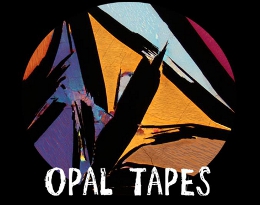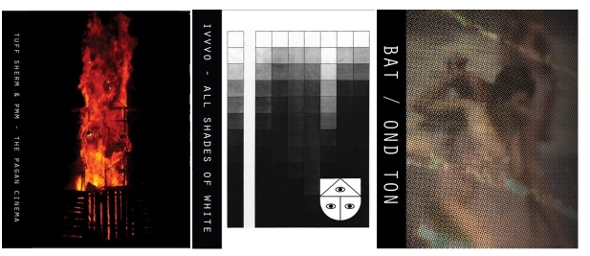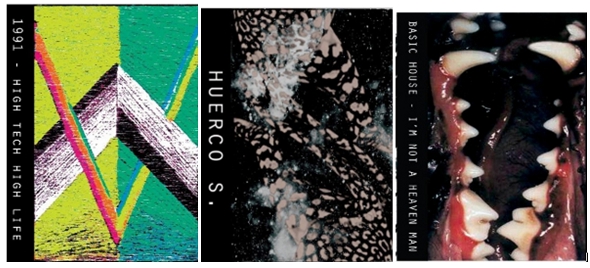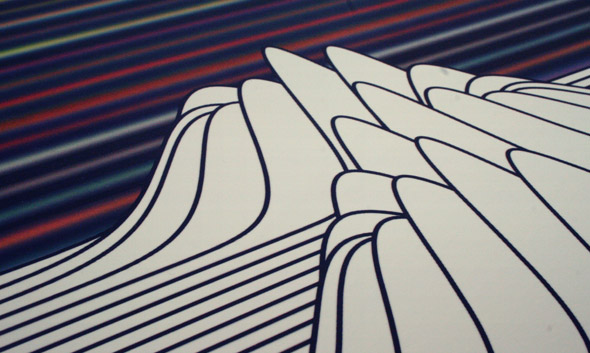Electronics and Scuzz: A discussion with Opal Tapes boss Stephen Bishop

Emerging from the murk of the cassette resurgence resplendent in non-household names and unconventional approaches, Opal Tapes can be counted as a shining example of the rewards to be reaped from an acute combination of curatorial dexterity and aesthetic pride. Surfacing midway through last year, Stephen Bishop’s labour of love has already acquired a respectable stature for a relatively new label, and is already fourteen instalments deep that run the gamut from decaying techno to dissociative noise. As the label’s Facebook mantra would have it, “tapes & records – electronics & scuzz”.
A grainy Skype connection ostensibly seems an appropriate communicative forum to chat with Stephen considering both the musical remit of the label and his own working practices, yet he rebukes the stereotype of socially awkward, reclusive academics so readily associated with those operating on the fringes of contemporary music. “The first interviews I was doing,” he explains, “people were wanting to know who was involved in the label, who was the graphic designer, who was mastering all this stuff, and it’s just me.” Any notion of self-aggrandisement is nowhere to be seen. “Opal got described as ‘a shadowy cassette label’ and I don’t perceive it as that because I just see it as me having an anxiety  attack on a computer for ten hours a day. I’m not a hoods up dark dude, I’m a pretty friendly dude, and I’d rather be that when people meet me. I’d rather not come across as some X-man.”
attack on a computer for ten hours a day. I’m not a hoods up dark dude, I’m a pretty friendly dude, and I’d rather be that when people meet me. I’d rather not come across as some X-man.”
From his current base in North-Eastern coastal town Redcar, he has worked tirelessly to further the profile of his treasured imprint through a prolific campaign of online networking, reaching out with warmth and positivity to create the gentle buzz that now exists around the label. To call it hyped would be an overstatement, but there’s no denying that Opal Tapes is firmly on the radar. Bishop’s own musical explorations as Basic House represent the first concrete forays into something approaching a production career after a life already spent devoted to sound in nebulous forms. After a whirlwind love affair with the noise scene in Newcastle, he and a friend decided to spend six months making music in a wooden cabin 27 miles from the nearest town in an Irish valley; proof of commitment if ever it were needed:
“We’d both been reading Henry David Thoreau’s Walden novel and bits of Kerouac,” Stephen recalls. “We were both full of the romance of the wild, and thought ‘right, we’ll just go and make love to the trees or something’. It was a total removal of everything that I was used to, and it was a massive shock to my system.”
While the isolated retreat has often been mooted as one of the great sources of inspiration for adventurous artists looking to shed the ephemera of modern life and home in on their creativity, things didn’t quite work out like that for Stephen and his co-conspirator Casper. “It totally broke apart a lot of the things that I was doing with music at the time,” Stephen explains, “and coming out of that I became incredibly unproductive. In fact I started to really dislike the process of a lot of music and a lot of art. Part of it was tied into the Internet, at the age where so much of my listening and my appreciation of art was being guided by the increasing speed of my Internet connection.”
It’s a contradictory precursor to the position Stephen is in now, where by his own admission Opal Tapes is firmly entrenched in the machinations of the internet, not least in the discovery of the musicians who produce the releases.
“A lot of people who I work with have been found through harvesting the likes of Soundcloud and YouTube,” Stephen readily reveals, “sometimes even searching things and filtering the results so it shows me the least amount of views. It’s almost a game in some ways, to set yourself an hour to try to find something with less than fifty plays that’s just totally rad.”
Considering he fingers his internet usage as a part of his momentary creative fatigue, it seems as though Stephen must have made peace with his online demons to be able to work in this way. It’s hard not to think of those involved in the world of cassettes as trading strictly by packages sent in brown envelopes and occasional messages sent on carrier pigeons in moments of frivolity. “It took me a while to realise just how strong digital communities can be,” he admits.
It is of course still a tape label first and foremost though, and with that comes a resolve to hold on to certain principles in terms of presentation and consumption. However, as might well be the case for a large number of cassette-mongers, practicalities were the driving influence behind the decision to go with reels over records.
 “The main reason was simply finance,” Stephen is quick to explain of the initial inspiration in his choice of format. “I much prefer analogue products to digital ones. I’m not against CDs by any means, I’ve got a bomb load of them, and for certain music it’s the best format, but tape just seemed to work well. I like the look of the tape, and I could financially find a core aesthetic and roll it a lot more easily than I would be able to with another format.”
“The main reason was simply finance,” Stephen is quick to explain of the initial inspiration in his choice of format. “I much prefer analogue products to digital ones. I’m not against CDs by any means, I’ve got a bomb load of them, and for certain music it’s the best format, but tape just seemed to work well. I like the look of the tape, and I could financially find a core aesthetic and roll it a lot more easily than I would be able to with another format.”
There’s no denying that the cost of any amount of artwork can cripple the chances of limited-run record releases, and the consistency of the sleeve and tape designs for Opal thus far lend themselves to those hoarding tendencies that pervade all collectors of music. While the artwork that adorns each cover are somewhat disparate, the formatting and arrangement ensures that a stack of Opal Tapes will look good together. However, the consistency doesn’t end there.
“If you run a tape label, no matter what music you throw onto a tape, if you always use the same tape stock and the same duplications then that’s almost like the fifth band member,” Stephen intones, a hint of fondness detectable in his voice. “It adds a filter to things, and so everything has a timbre which is associated only to my duplication. If I was using some Nakamichi Dragon, two thousand pound tape recorder then it would probably sound better than some CDs, but I’m not. I’m using an Akai and it’s old.”
Tape is arguably a more over-bearing format than its analogue counterpart, vinyl. While wax has its fair share of constraints to be imposed on fitting music onto a limited space subject to physical forces, even more is dictated about the listening experience when tape is the vessel. As such, it seemed pertinent to ask whether the format-driven nature of the label imposed creative imperatives on the output for Opal. “I think the one thing that sets tape aside from any other format is that the two sides really have to be as balanced as possible in terms of length, or at least the A side always has to be the longer, so you do have to organise your compositions in terms of that,” Stephen explains.
“Some of the artists are very cocksure of how they want their sides to run, and I have all respect for that,” he continues. “Others deliver me x amount of tracks from which I’ll select, but I’ve never had a distinct conversation with any of the artists specifically about format politics.”
If there is one overriding feeling that hovers around Opal Tapes, it’s that of the DIY ethic. The presentation of the label is actually quite slick, with Stephen clearly a dab hand at graphics and layout, but when you find yourself lost in the sonic netherworld of the Wanda Group release, or flailing for a grip on the cobwebbed house impressions of Ond Ton, there is a sense of low budget charm that calls to mind the defiant anti-polish of punk.
“We’re in a phase at the moment where techno and house and musical tropisms are just being blown apart by punks essentially.”
It’s a conscious choice of Stephen’s to steer in that direction, and he couldn’t provide a better example than in his dealings with Ñenado, who has made a single Opal appearance on the Cold Holiday compilation. “This guy makes really gorgeous Jan Jelinek-style micro click house which I really love,” Stephen enthuses, “but he ends up sending me things which are just completely unsuitable. They’re almost too good, and it’s hard to tell that to someone honestly and say, ‘make something worse for me please’! Particularly when English isn’t necessarily their first language.”
Of another artist on the compilation, he laments that the majority of their music is, “just too clean, too digital, too self-aware for Opal Tapes.” It’s a stance that carries plenty of weight in these times, when lo-fi is venerated and embraced in so much of leftfield music, filling in the gap where glitch and hyper-production once existed. There are times when that deliberate dressing down can feel self-conscious in itself, and it’s certainly no substitute for good old fashioned ideas, but in the context of Opal Tapes, there feels a greater creative purpose. These producers couldn’t clean up their sound if they tried to, and the idea of a big studio and a heavyweight producer trying to wrestle crisp, punchy dynamics out of, say, a 51717 track is quite simply laughable.
“We’re in a phase at the moment where techno and house and musical tropisms are just being blown apart by punks essentially,” Stephen muses, “by people who aren’t necessarily very good at composing music but who have got an intention and have got a heart and they just want to stab it in. I feel that.” It’s the same obtuseness that pervaded in the foundational days of industrial, and it’s hard to play down the sonic resemblances and their resultant emotional effect.
“People have been influenced by early industrial throughout my listening age,” he continues, “I recognise that. At the moment though it just strikes a chord with a new generation of listeners. It’s a different time though man. The stuff that Coil and Nurse With Wound and Throbbing Gristle were making their music on is fetish now and it’s expensive. People of my ilk who are approaching stuff in the same way are doing so with a Macbook, with VSTs. It’s a technologically driven thing. It’s white folks approaching techno. If the rhythm isn’t inherent then the rhythm can be forced from the machine.”
For all the abstract textures and beatless gloom that can be found on Opal Tapes, it’s easy to forget that there is a 4/4 heart limping away underneath the glorious rubble. At times, the techno becomes explicit, as on the visceral throwdown that is MCMXCI’s Skogen, Flickan och Flaksan or in the spacious swing of Huerco S. when he gets into a groove, but for the most part the beat stands politely at the back steering the baying mobs of noise without ever letting them know. The first whiff of control and many tracks dutifully cut loose the stabilisers and let themselves career off the path with glee.
“There has been this cross-pollination between people who are working with techno and people who are working in noise, which has been going on for a lot longer than people would give it credit for,” Stephen says of this brave new thread unravelling itself from the firmament of house and techno. “It’s just what I like listening to, and I don’t compartmentalise my listening into techno, post techno, noise. It’s just sounds. I listen to loads of music; I don’t just listen to this stuff. If you just listened to this stuff you wouldn’t have much of a smile on your face much of the time!”
This single-minded approach is what defines the form that Opal Tapes has taken (and continues to take), reflecting Stephen’s own penchant for collisions of ambient experimentation and wayward rhythm, and it’s something that he is now funnelling into the live arena. The status of the label is affording him opportunities to DJ elongated sets to crowds without the demands of a fickle dancefloor, while live performances promise to bring a healthy dose of unpredictability into the slowly forming Basic House sound.
 “It’s very improvised,” Stephen explains of his burgeoning live set, which debuted in his old stomping ground of Newcastle. “I’ll just make a loose structure in Ableton but then I’ll draw little parts from the time I spent in an electro-acoustic improv group and try and bring that into a sort of techno-y backbone.”
“It’s very improvised,” Stephen explains of his burgeoning live set, which debuted in his old stomping ground of Newcastle. “I’ll just make a loose structure in Ableton but then I’ll draw little parts from the time I spent in an electro-acoustic improv group and try and bring that into a sort of techno-y backbone.”
With generative patches in Reaktor cavorting in side chain compressors with invisible kick drums, and contact mics raining down on-the fly scratches, scuffs and scrapes, it promises to deliver more than the usual pre-mapped automation of so many live sets of these times. “That’s the stuff that I was attempting to do ten years ago,” Stephen reveals, “but I think now I’m just a bit calmer and I can put it together more concisely. I think I was a little hung up on shock factor when I was twenty, I was coming from hardcore and heavy metal.”
While these performances have been slow to emerge behind the initial run of the label, now the potential for gigging is becoming ever more real and the hope of receptive audiences in other parts of the world, or even just the UK, provides an unavoidable draw for Stephen. “It’s starting to get to the point now where I feel like the next place to take Opal will be on the road somehow, even if it’s just me and someone else to begin with,” he muses. “Lewis Johnston (Wanda Group) couldn’t be harder it seems to get out of the flat, but I’d love to go and do some shows with him. I’ve made connections with dudes in Bristol and the Gnod crew in Manchester, and a lot of people in Spain seem to have really dug into Opal Tapes really quick on, but as is often the case with my life the moment all of these opportunities arise, I end up getting a job!”
“It’s almost a game in some ways, to set yourself an hour to try to find something with less than fifty plays that’s just totally rad.”
There’s a twist to Stephen’s set-up in starting Opal Tapes which doesn’t seem to ring true with very many label owners in these times, coming as a result of the economic downturn and the ensuing dearth of jobs in and around Redcar. “Opal Tapes has been my job for the last six months so I think part of the success was down to my need to make some money,” he admits, eschewing the likely trend of labels as expensive hobbies rather than profitable businesses, “in which case I was hammering emails out and trying my best to do A&R and control the aesthetic of the label. I’m aware of how much that sells itself.”
It’s hard to not be somewhat surprised at such a candid and canny business sense in an underground creative venture, as the two notions tend to be somewhat polarised, but it gives a refreshing vigour to the way in which Opal Tapes is disseminated, and the proof is most surely in the pudding.
“I’ve seen so many fledgling labels come out with their releases and not sell them, and they end up sitting on stock for years and end up folding because they’re not making any money,” Stephen points out, “and as sad as that is you’ve got to know what’s gonna sell. I was fortunate that Eugene Dro Carey was up for doing something for the first release [under the alias Tuff Sherm]. Obviously it instantly draws a lot of attention to the label and it helps the tapes sell. That first run all sold and I was able to budget, and then put the money back in where it needed to go and then reissued the things which people were going after, which was particularly the Huerco S joint.”
 The notion of reinvesting seems to be a pertinent one to Stephen, who with his limited runs of cassettes has been operating on something of a cyclical finance that has allowed him to grow the label by steadily fuelling the successful releases and feeding the rewards from those into further expanding the label. The latest step in that ongoing development has been the 12” pressing of the MCMXCI, the first vinyl cut for Opal which has come as a knock-on result of Boomkat’s investment in pressing up the 1991 “High-Tech High-Life” release for their Boomkat Editions series.
The notion of reinvesting seems to be a pertinent one to Stephen, who with his limited runs of cassettes has been operating on something of a cyclical finance that has allowed him to grow the label by steadily fuelling the successful releases and feeding the rewards from those into further expanding the label. The latest step in that ongoing development has been the 12” pressing of the MCMXCI, the first vinyl cut for Opal which has come as a knock-on result of Boomkat’s investment in pressing up the 1991 “High-Tech High-Life” release for their Boomkat Editions series.
There is a sense that Opal now stands at a pivotal crossroads, growing beyond the financial trappings of cassettes and inviting licensing from larger operations. Even Stephen’s dogged belief in format has been challenged by the call for downloadable releases. “I was very hesitant about it,” he says of the decision to offer digital versions of the releases on the Opal Tapes Bandcamp.
“I’m aware of how quickly music is ripped and re-appropriated. If someone wants to steal something they’ll steal it, and sometimes stealing leads to the buying. I tend to be quite analogue centric, but I was just receiving so much email about digital availability and there is this generation of buyers who are 18 and who to them the idea of spending five quid on a download is no big deal. What I respect most deeply with those dudes is that they are obviously just into it for the sonics, and it defies my original intention but at the same time really the only intention is ever to simply put the music out. It’s not…” Stephen catches himself treading dangerously close to the edge of his principles. “Well it is for me very much about the tape!”
Amongst these issues of expansion and how best to approach it, Stephen reels off projected releases including a possible ‘Opal Discs’ venture into CD with a side project from Driphouse, and a new tape series entitled Mirror & Gate with Matthew Kent of burgeoning blog Blowing Up The Workshop. You can sense the bubbling of many other ideas in various states of formation just beneath the surface, and one gets the sense that controlling his own ambition will be one of Stephen’s greatest challenges as the label continues to grow. For the time being though, he seems comfortable keeping everything in perspective.
“I don’t want everything to blow out too much,” he calmly states. “It’d still be nice to keep this foundation of tape releases and pure underground music.”
Oli Warwick